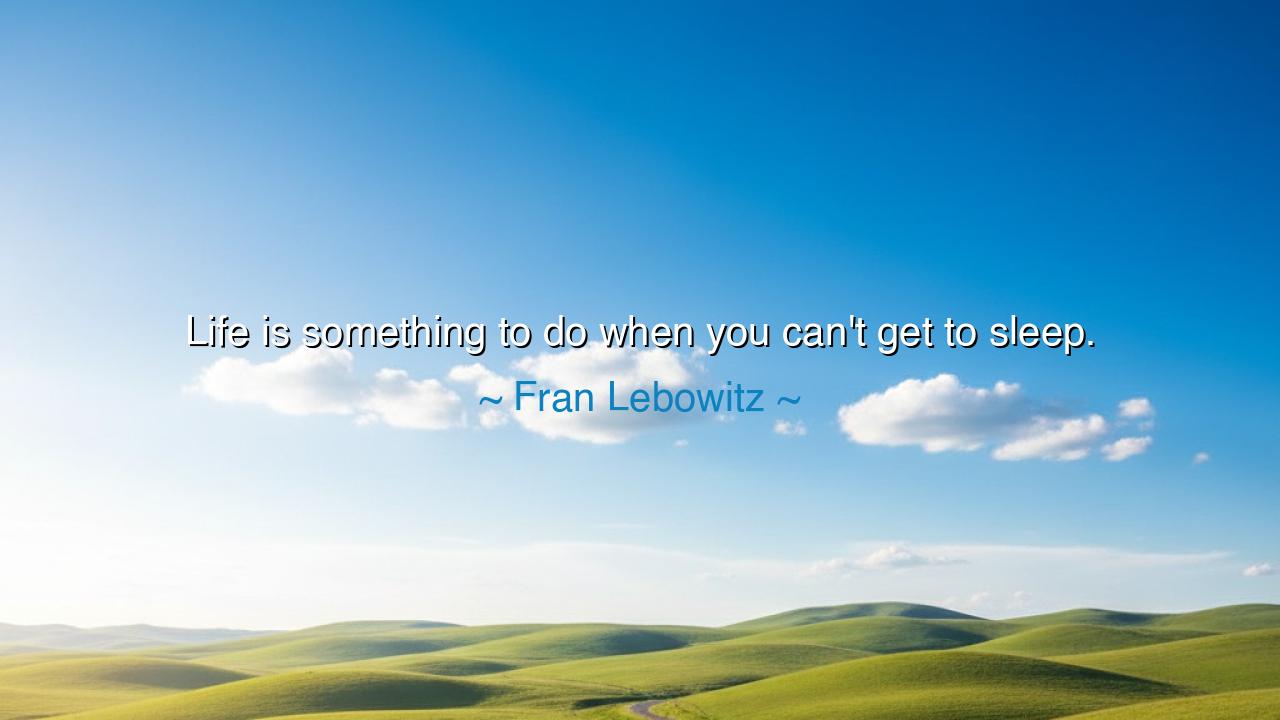
Life is something to do when you can't get to sleep.






“Life is something to do when you can’t get to sleep.” – Fran Lebowitz
In these wry and deceptively simple words, Fran Lebowitz, the great humorist and philosopher of urban life, captures one of the most paradoxical truths of human existence. Her tone, laced with irony, conceals both weariness and wisdom. To say that life is something to do when you can’t get to sleep is to mock the seriousness with which people chase meaning — and yet, within the mockery, there lies a quiet understanding: that perhaps life itself, with all its striving and noise, is a distraction from the stillness we both seek and fear. Her humor, like that of the ancient cynics, masks philosophy; her jest is a mirror that reflects both laughter and melancholy.
Lebowitz, a chronic observer of modern absurdity, speaks in the spirit of those who have grown weary of humanity’s endless pursuit of purpose. In her world, people rush about seeking wealth, fame, love, and enlightenment — all while missing the simple fact that life is brief, chaotic, and often beyond understanding. Her statement does not deny the value of living; it challenges the illusion of control. To her, the human condition is restless — forever awake, forever distracted, forever searching for something that might let it finally rest. In this sense, her quip becomes a parable: life, that ceaseless activity, is what we do because we cannot bear the silence of eternal sleep.
The ancients, too, wrestled with this truth. Epicurus, the philosopher of contentment, taught that peace comes not from constant doing, but from accepting the limits of desire. Yet men and women throughout history have done just the opposite — filling their days with busyness to avoid the great questions of being. Lebowitz’s observation stands beside that wisdom, mocking the restless heart of modern man who cannot be still. In her irony, we hear echoes of the Stoics, who said that to live well is to understand the absurdity of much that we do, and to find serenity amid the futility.
But there is another tone hidden beneath her wit — a whisper of existential weariness. To compare life to the passing hours of sleeplessness is to reveal an understanding of the loneliness of consciousness. For who has not known those long nights when the world is quiet, and thought itself becomes both companion and tormentor? In such moments, life seems both infinite and meaningless, filled with movement yet going nowhere. Lebowitz’s humor softens this truth, but does not erase it: to live is to endure the endless wakefulness of being aware. The one who cannot sleep is the one who cannot stop thinking — and perhaps that is the human curse.
Consider the story of Voltaire, who, like Lebowitz, turned irony into philosophy. Surrounded by the chaos of revolutions and false prophets, he too laughed at the folly of existence. “We must cultivate our garden,” he said at the end of Candide, meaning that in a world filled with confusion, the best we can do is tend to our small corner of life. So too with Lebowitz’s saying: if life is what we do while we cannot sleep, then perhaps our task is not to find its grand meaning, but to live it gracefully, even absurdly — to make of our wakefulness a kind of art.
Her statement, though humorous, offers a profound challenge: to see life not as a burden or a puzzle to be solved, but as a momentary performance — fleeting, strange, and worth enjoying while it lasts. For if existence is a kind of insomnia, then laughter becomes our lullaby. By turning despair into humor, Lebowitz teaches what the ancients knew: that irony can be a form of wisdom, and that to laugh at life is not to dismiss it, but to bear it more lightly.
The lesson is this: do not take life too solemnly, for its meaning is not always hidden in deep philosophy — sometimes it rests in the act of living itself. If you find yourself restless, uncertain, or weary of existence, do not curse the wakefulness; use it. Read, walk, love, create, question — fill the hours not with despair but with curiosity. The night may be long, but it need not be empty. Let life, as Fran Lebowitz suggests, be your answer to sleeplessness — a strange, beautiful pastime between the silence of birth and the rest of death.
So live, laugh, and labor as one who knows that perhaps no grand purpose will ever be revealed — and that this is not tragedy, but freedom. For when all philosophies fade, what remains is the simple act of being awake in a world that is both mysterious and absurd. And in that wakefulness, fleeting as it is, lies the quiet glory of being alive.






AAdministratorAdministrator
Welcome, honored guests. Please leave a comment, we will respond soon